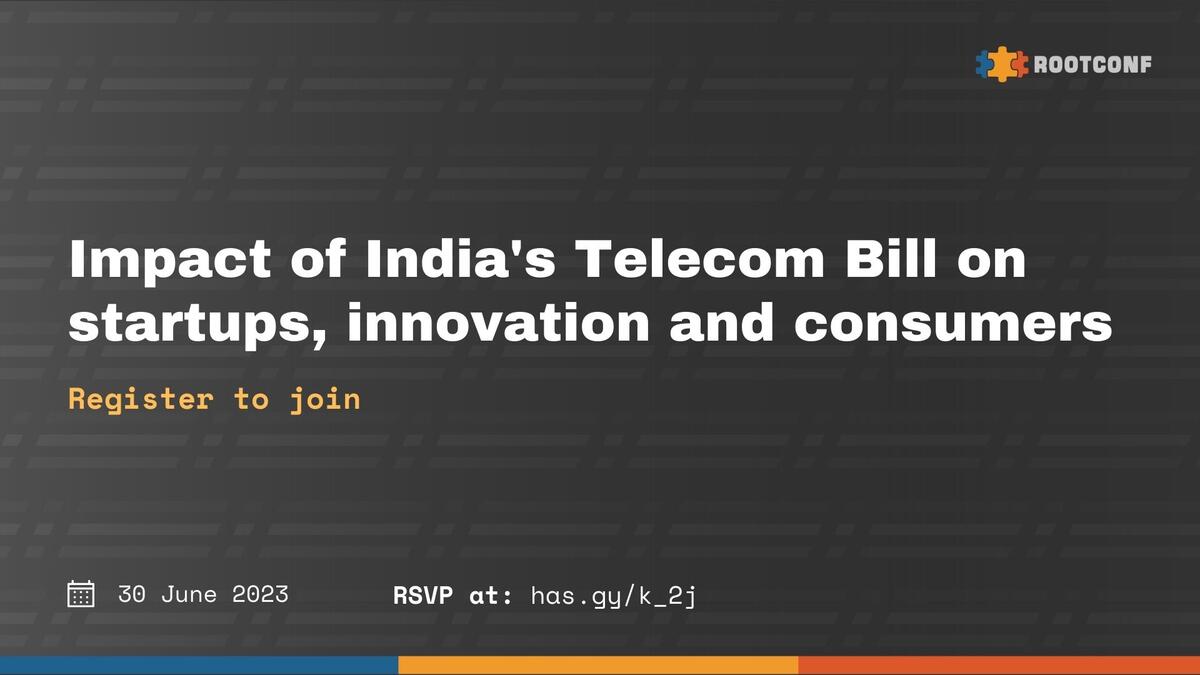
Impact of India's Telecom Bill on startups, innovation and consumers
A series of discussions to increase public participation in upcoming tech policy reform
Jun 2023
26 Mon
27 Tue
28 Wed
29 Thu
30 Fri 05:30 PM – 07:00 PM IST
1 Sat
2 Sun
Submitted Jun 29, 2023
Innovation and business: The telecom industry is undergoing a radical transformation with the adoption of 5G, IoT, AI, etc. These new technologies are driving growth and new business models around multimedia content, payments, cybersecurity, healthcare etc. Is this draft bill going to support innovation and help startups capitalise on these opportunities, or hinder their growth?
Regulatory compliance: Some of the proposals in the draft bill, such as licensing of communication apps, could increase the operational costs for startups and end users. This would in turn hinder access to affordable, reliable and secure services. Have the needs of all stakeholders been considered in the framing of the bill, especially startups and users?
Impact on users: The draft bill expands the government’s ability to intercept encrypted communications and introduces new identity verification norms, which could undermine the privacy rights of individuals. Additionally, the bill grants the government extensive powers to suspend telecom and internet services during emergencies, without adequate safeguards. Will these issues affect the larger goal of making India a global leader in telecommunications?
Introductions
Topics:
Innovation and business - With all the buzz around AR/VR recently, I will start with a question about the exciting new world of mixed-reality. The high speeds and low latency of next generation networks is going to lead to an explosion of immersive multimedia experiences and digital entertainment products. For startups in this space, the idea of a new telecom law can seem intimidating. What would a founder want in terms of policy enablers and incentives to continue innovating?
We are seeing computation-intensive tasks being offloaded to the network’s edge, reducing the burden on the core network. There’s a lot of innovation potential here. How can the government incentivise more of this by easing the burden on startups, rather than trying to regulate them?
These innovations are good examples of how digital technologies are converging. Does the draft telecom bill do a good job of addressing the issue of convergence?
Regulatory compliance
The bill has a wide definition of ‘telecommunication services’ (includes broadcasting, e-mail, video communication services, M2M, OTT communication services etc.). Based on what we’ve heard about the innovation potential - should these services be subject to a licensing regime?
When operational costs for a telecom service increases (for eg. to obtain a new licence) - who pays the price? Can you talk us through the potential commercial implications for end users?
Impact on users
This bill was a great opportunity to introduce reforms on government surveillance and internet shutdowns. What are some specific safeguards the government could have introduced? Why has civil society pressure over the years and even judicial interventions not influenced change?
We have already had a debate on the dangers of mandating traceability of encrypted communications (re: the IT rules) - is the telecom bill just old wine in a new bottle?
What are the financial and non-monetary costs of surveillance on society? Can India be a global telecom leader without adequate safeguards for its citizens?
Hosted by
Supported by
Partner
{{ gettext('Login to leave a comment') }}
{{ gettext('Post a comment…') }}{{ errorMsg }}
{{ gettext('No comments posted yet') }}